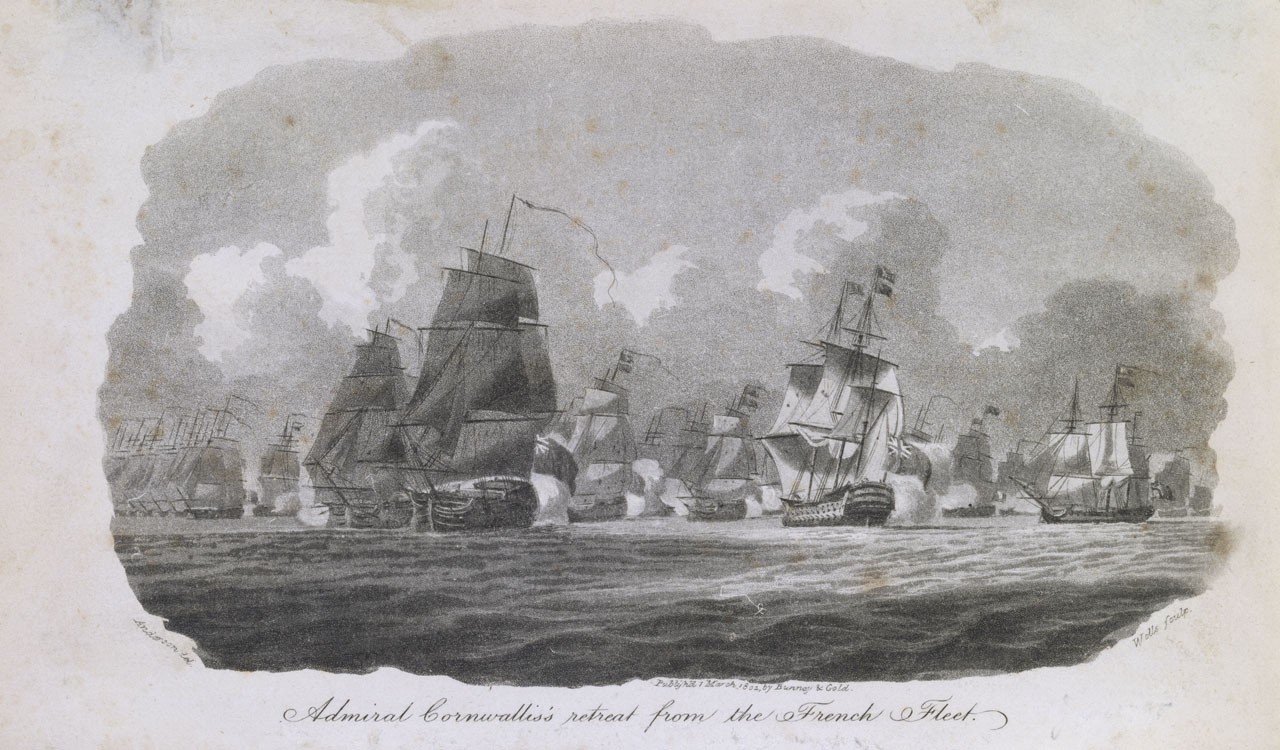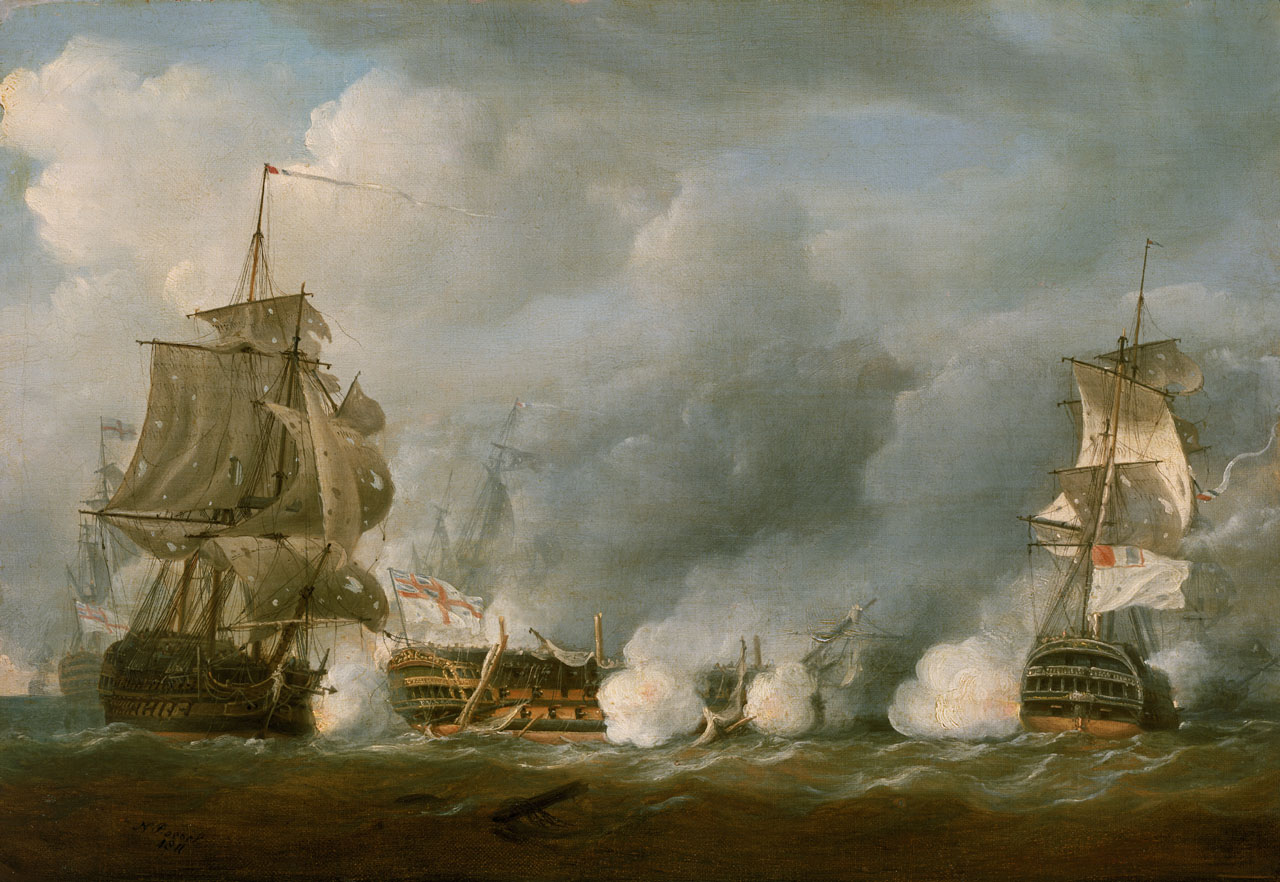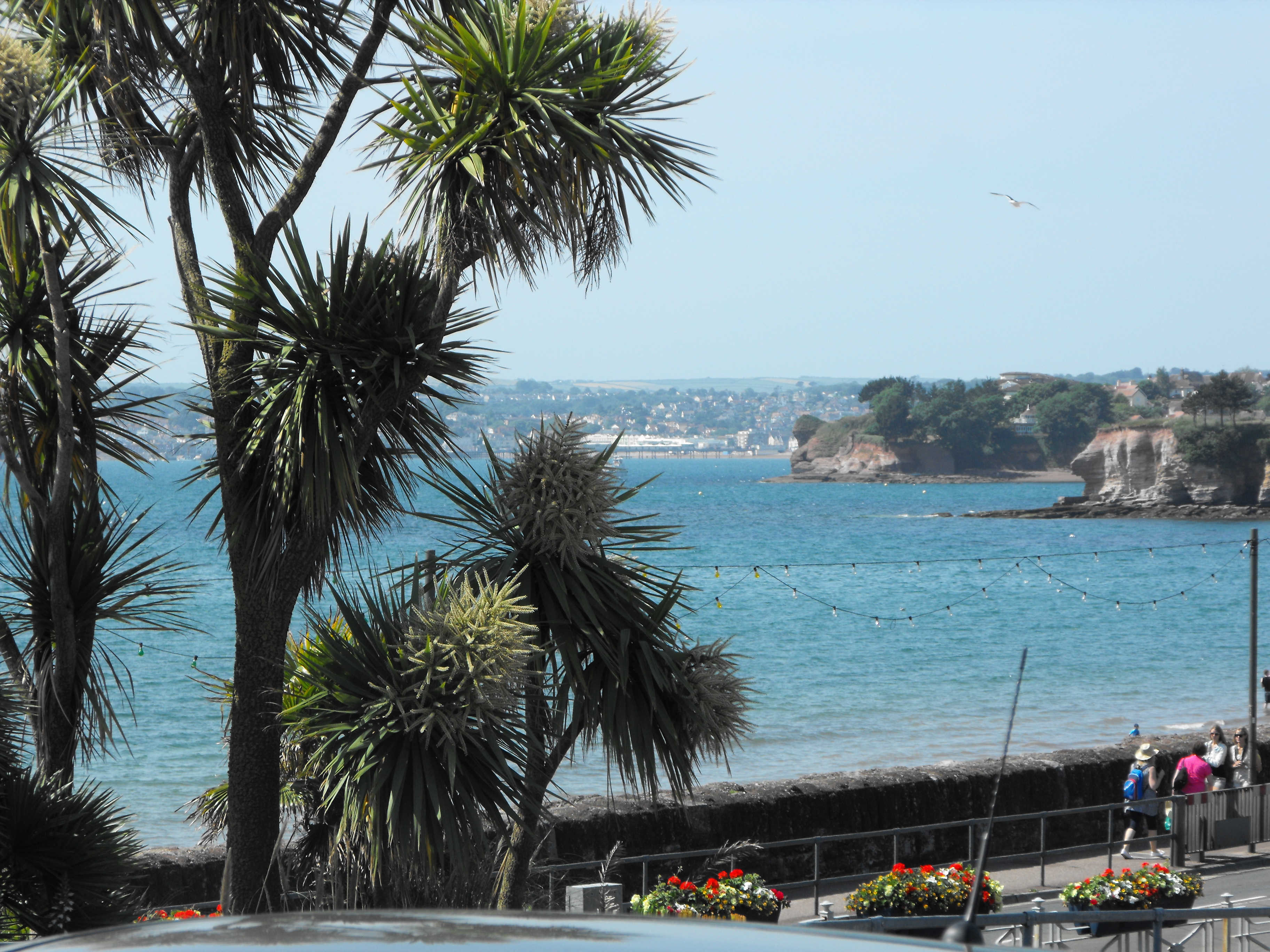|
Cornwallis's Retreat
Cornwallis's Retreat was a naval engagement during the French Revolutionary Wars in which a British Royal Navy squadron of five ships of the line and two frigates was attacked by a much larger French Navy fleet of 12 ships of the line and 11 frigates. The action took place in the waters off the west coast of Brittany on 16–17 June 1795 (28–29 Prairial an III of the French Republican Calendar). A British naval squadron under Vice-Admiral William Cornwallis began operating off Brittany on 7 June; in the following week he attacked a French merchant convoy and captured several ships. In response, Vice-admiral Louis Thomas Villaret de Joyeuse led the main French fleet out of port to attack the British, who were spotted on 16 June. Heavily outnumbered, Cornwallis turned away from the French and attempted to escape into open water, with the French fleet in pursuit. After a full day's chase the British squadron lost speed, due to poorly loaded holds on two of their ships, and the ... [...More Info...] [...Related Items...] OR: [Wikipedia] [Google] [Baidu] |
War Of The First Coalition
The War of the First Coalition () was a set of wars that several European powers fought between 1792 and 1797, initially against the Constitutional Cabinet of Louis XVI, constitutional Kingdom of France and then the French First Republic, French Republic that succeeded it. They were only loosely allied and fought without much apparent coordination or agreement; each power had its eye on a different part of France it wanted to appropriate after a French defeat, which never occurred. Shusterman, Noah (2015). ''De Franse Revolutie (The French Revolution)''. Veen Media, Amsterdam. (Translation of: ''The French Revolution. Faith, Desire, and Politics''. Routledge, London/New York, 2014.) Chapter 7, pp. 271–312: The federalist revolts, the Vendée and the beginning of the Terror (summer–fall 1793). Relations between the French revolutionaries and neighbouring monarchies had deteriorated following the Declaration of Pillnitz in August 1791. Eight months later, Louis XVI and the Leg ... [...More Info...] [...Related Items...] OR: [Wikipedia] [Google] [Baidu] |
Belle Île
Belle-Île (), Belle-Île-en-Mer (), or Belle Isle (, ; ) is a French island off the coast of Brittany in the ''département in France, département'' of Morbihan, and the largest of Brittany's islands. It is from the Quiberon peninsula. Administratively, the island is divided into four commune in France, communes: * Bangor (Morbihan), Bangor * Le Palais * Locmaria * Sauzon Belle-Île formed a canton in France, canton until 2015 when it was merged into the canton of Quiberon as part of a general overhaul. Geography The island measures and has an average elevation of . The area is about . The coasts are a mixture between dangerously sharp cliff edges on the southwest side, the ''Côte Sauvage'' ("wild coast"), and placid beaches, the largest being ''les Grands Sables'' ("the great sands") and navigable harbours on the northeast side. The island's climate is oceanic climate, oceanic, having less rain and milder winters than on the mainland. The two main ports are Le Palais (ac ... [...More Info...] [...Related Items...] OR: [Wikipedia] [Google] [Baidu] |
Bordeaux
Bordeaux ( ; ; Gascon language, Gascon ; ) is a city on the river Garonne in the Gironde Departments of France, department, southwestern France. A port city, it is the capital of the Nouvelle-Aquitaine region, as well as the Prefectures in France, prefecture of the Gironde department. Its inhabitants are called "''Bordelais'' (masculine) or "''Bordelaises'' (feminine). The term "Bordelais" may also refer to the city and its surrounding region. The city of Bordeaux proper had a population of 259,809 in 2020 within its small municipal territory of , but together with its suburbs and exurbs the Bordeaux Functional area (France), metropolitan area had a population of 1,376,375 that same year (Jan. 2020 census), the sixth-most populated in France after Paris, Lyon, Marseille, Lille, and Toulouse. Bordeaux and 27 suburban municipalities form the Bordeaux Métropole, Bordeaux Metropolis, an Indirect election, indirectly elected Métropole, metropolitan authority now in charge of wi ... [...More Info...] [...Related Items...] OR: [Wikipedia] [Google] [Baidu] |
Jean Gaspard Vence
Jean Gaspard de Vence (; 6 April 1747 – 12 March 1808) was a French privateer, admiral and Maritime Prefect of Toulon. Biography In 1762 at age 15 he entered the merchant navy in Bayonne, sailed to Saint-Domingue and several years later became a captain. Transferred to the Royal Navy, served on a 74-gun battleship ''Protecteur'', incidentally studying mathematics and navigation. Then returned to the merchant navy and in 1767 aboard the ship ''Auguste'' take a cruise along the coast of Africa, near Cape St. Philip was in a shipwreck more than four months and get to Marseille, losing half the crew from scurvy. Corsair and officer of the King during the American War In 1776, he moved to Martinique, where at the beginning of the American War of Independence has received from Congress the right to privateering under the American flag. He served as captain of the xebec ''Victoire'', on 17 May 1777 led by a 14-gun privateer ''Tigre'', which took on board the 24-gun British merch ... [...More Info...] [...Related Items...] OR: [Wikipedia] [Google] [Baidu] |
Glorious First Of June
The Glorious First of June, also known as the Fourth Battle of Ushant, (known in France as the or ) was fought on 1 June 1794 between the British and French navies during the War of the First Coalition. It was the first and largest fleet action of the French Revolutionary Wars. The action was the culmination of the Atlantic campaign of May 1794, which had criss-crossed the Bay of Biscay over the previous month and saw both sides capturing numerous merchant ships and small warships along with engaging in two partial, but inconclusive, fleet actions. The British Channel Squadron under Admiral Lord Howe attempted to prevent the passage of a vital French grain convoy from the United States, which was protected by the French Atlantic Squadron, commanded by Counter-admiral Louis Thomas Villaret de Joyeuse. The two forces clashed in the Atlantic Ocean, some west of the French island of Ushant on 1 June 1794. During the battle, Howe defied naval convention by ordering his f ... [...More Info...] [...Related Items...] OR: [Wikipedia] [Google] [Baidu] |
Blockade
A blockade is the act of actively preventing a country or region from receiving or sending out food, supplies, weapons, or communications, and sometimes people, by military force. A blockade differs from an embargo or sanction, which are legal barriers to trade rather than physical barriers. It is also distinct from a siege in that a blockade is usually directed at an entire country or region, rather than a fortress or city and the objective may not always be to conquer the area. A blockading power can seek to cut off all maritime transport from and to the blockaded country, although stopping all land transport to and from an area may also be considered a blockade. Blockades restrict the trading rights of neutrals, who must submit for inspection for contraband, which the blockading power may define narrowly or broadly, sometimes including food and medicine. In the 20th century, air power has also been used to enhance the effectiveness of blockades by halting air traffic w ... [...More Info...] [...Related Items...] OR: [Wikipedia] [Google] [Baidu] |
Torbay
Torbay is a unitary authority with a borough status in the ceremonial county of Devon, England. It is governed by Torbay Council, based in the town of Torquay, and also includes the towns of Paignton and Brixham. The borough consists of of land around the east-facing Tor Bay, part of Lyme Bay on the English Channel. (Word document) A popular tourist destination, Torbay's sandy beaches, mild climate and recreational and leisure attractions have given rise to its nickname of the ''English Riviera''. The neighbouring districts are South Hams and Teignbridge. History Human bones and tools found in Kents Cavern in Torquay show that people have inhabited the Torbay area since Paleolithic times. A maxilla fragment known as Kents Cavern 4 may be the oldest example of a modern human in Europe, dating back to 37,000–40,000 years ago. Roman soldiers are known to have visited Torquay during the period when Britannia formed a part of the Roman Empire; they left offeri ... [...More Info...] [...Related Items...] OR: [Wikipedia] [Google] [Baidu] |
Portsmouth
Portsmouth ( ) is a port city status in the United Kingdom, city and unitary authority in Hampshire, England. Most of Portsmouth is located on Portsea Island, off the south coast of England in the Solent, making Portsmouth the only city in England not located primarily on the Great Britain, mainland. The city is located south-east of Southampton, west of Brighton and Hove and south-west of London. With a population last recorded at 208,100, it is the most densely populated city in the United Kingdom. Portsmouth forms part of the South Hampshire urban area with Gosport, Borough of Fareham, Fareham, Borough of Havant, Havant, Borough of Eastleigh, Eastleigh and Southampton. Portsmouth's history can be traced to Roman Britain, Roman times and has been a significant Royal Navy dockyard and base for centuries. Portsmouth was founded by Anglo-Norman merchant Jean de Gisors in the south-west area of Portsea Island, a location now known as Old Portsmouth. Around this time, de Gis ... [...More Info...] [...Related Items...] OR: [Wikipedia] [Google] [Baidu] |
Alexander Hood, 1st Viscount Bridport
Admiral Alexander Hood, 1st Viscount Bridport, KB (2 December 17262 May 1814) was a Royal Navy officer and politician who served in the French Revolutionary and Napoleonic Wars. Origins He was a younger son of the Rev. Samuel Hood (1691/2 – 1777), Vicar of Butleigh and prebendary of Wells Cathedral (both in Somerset) and Vicar of Thorncombe in Devon (whose monument survives in St Leonard's Church, Butleigh), by his wife Mary Hoskins, a daughter of Richard Hoskins, Esquire, of Beaminster, Dorset. His elder brother was Admiral Samuel Hood, 1st Viscount Hood (1724–1816). The sons of his first cousin Samuel Hood (1715–1805), a purser in the Royal Navy included Admiral Sir Samuel Hood, 1st Baronet (1762–1814), Captain Alexander Hood (1758–1798) and Captain Arthur Hood (1754–1776). Career The story of his entry into the navy is recounted by Edmund Lodge (1756–1839) (a personal acquaintance of Lord Bridport) in his ''Portraits of Illustrious Personages of Great Br ... [...More Info...] [...Related Items...] OR: [Wikipedia] [Google] [Baidu] |
Richard Howe, 1st Earl Howe
Admiral of the Fleet Richard Howe, 1st Earl Howe (8 March 1726 – 5 August 1799) was a Royal Navy officer and politician. After serving in the War of the Austrian Succession, he gained a reputation for his role in amphibious operations against the French coast as part of Britain's policy of naval descents during the Seven Years' War. He also took part, as a naval captain, in the decisive British naval victory at the Battle of Quiberon Bay in November 1759. In North America, Howe is best known for his service during the American War of Independence, when he acted as a naval commander and a peace commissioner with the American rebels; he also conducted a successful relief during the Great Siege of Gibraltar in the later stages of the War. Howe later commanded the victorious British fleet during the Glorious First of June in June 1794 during the French Revolutionary Wars. Early career Howe was born in Albemarle Street, London, the second son of Emanuel Howe, 2nd Viscount ... [...More Info...] [...Related Items...] OR: [Wikipedia] [Google] [Baidu] |
Western Approaches
The Western Approaches is an approximately rectangular area of the Atlantic Ocean lying immediately to the west of Ireland and parts of Great Britain. Its north and south boundaries are defined by the corresponding extremities of Britain. The coast of the mainland forms the eastern side and the western boundary is the 30 degree meridian, which passes through Iceland. The area is particularly important to the United Kingdom, because many of its larger shipping ports lie within it. The term is most commonly used when discussing naval warfare, notably during the Napoleonic Wars, the First World War and the Battle of the Atlantic during the Second World War in which Nazi Germany's ''Kriegsmarine'' attempted to blockade the United Kingdom using submarines (U-boats) operating in this area. Since almost all shipping to and from the United Kingdom passed through this area, it was an excellent hunting ground and had to be heavily defended. See also *Irish Sea *GIUK gap The GIUK gap ... [...More Info...] [...Related Items...] OR: [Wikipedia] [Google] [Baidu] |







